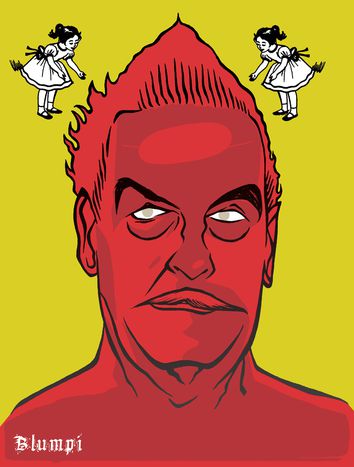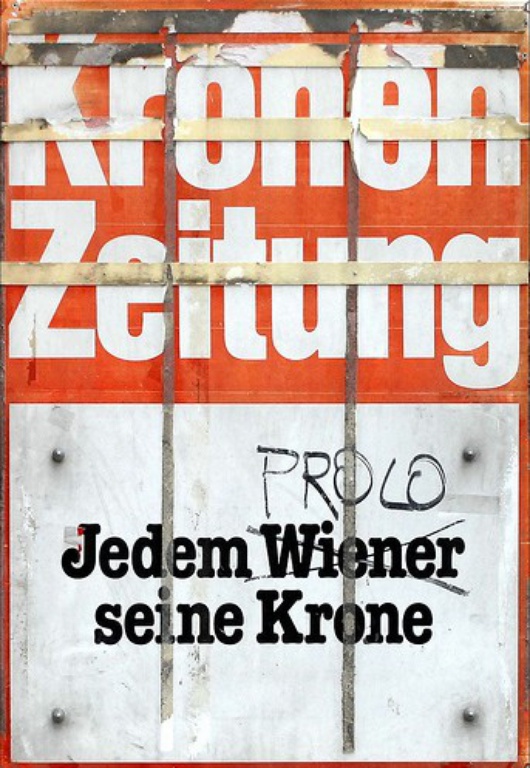
Austrian tabloids make global headlines with Joseph Fritzl, incest father
Published on
Translation by:
 Lucy Davies
Lucy Davies
Shortly before the incest trial begins on 16 March, the Vienna theatre production of 'Pension F.' is bringing the oppressive atmosphere surrounding the Fritzl case onto the stage, meaning it is not only 'the man on the street’s paper' who is discussing what happened in that cellar
On 16 March the trial of the incest father who locked up his daughter in a cellar in Amstetten, Lower Austria, will begin. In the run up, the Viennese 'theatre maker’ Hubert 'Hubsi' Kramer has succeeded in provoking such a debacle amongst local tabloids with his comic play Pension F., which is about the media exploitation of the story, that it even seemed newsworthy to the BBC.
It is a remarkable phenomenon then that an artist from the experimental theatre scene would ever attract the interest of the most widely read daily paper in the country, the Kronen Zeitung. It is also noteworthy that something mentioned in the Austrian gutter press would most probably be too provincial to be reported internationally. What has happened here?
'To each Austrian his crown'
 The most powerful news medium in the land, with a readership of 42.2% (according to the Österreichischen Median Analyse’s ('Austrian Media Analysis') latest statistics, is known popularly as 'die Krone' ('the crown'). Now and then the paper decorates its logo with a stylised emperor’s crown in the style of the original historical version of the Habsburg monarchy and the inter war years. The Illustrierte Kronen Zeitung was founded in the year 1900. Its former slogan to each Austrian his crown played with the people’s longing for the lost Austro-Hungarian empire and getting, at least on a small scale, some of the greatness and power back. The newspaper bases its success on simple tabloid principles: affordable price, manageable format, reports about everyday people. What makes the Kronen Zeitung phenomenon so unique is that it also reaches the middle classes. It is an authority, a barometer of the country’s mood. Even the cardinal of the catholic church in Austria as well as the European parliament representative Hans Peter Martin write columns in the paper.
The most powerful news medium in the land, with a readership of 42.2% (according to the Österreichischen Median Analyse’s ('Austrian Media Analysis') latest statistics, is known popularly as 'die Krone' ('the crown'). Now and then the paper decorates its logo with a stylised emperor’s crown in the style of the original historical version of the Habsburg monarchy and the inter war years. The Illustrierte Kronen Zeitung was founded in the year 1900. Its former slogan to each Austrian his crown played with the people’s longing for the lost Austro-Hungarian empire and getting, at least on a small scale, some of the greatness and power back. The newspaper bases its success on simple tabloid principles: affordable price, manageable format, reports about everyday people. What makes the Kronen Zeitung phenomenon so unique is that it also reaches the middle classes. It is an authority, a barometer of the country’s mood. Even the cardinal of the catholic church in Austria as well as the European parliament representative Hans Peter Martin write columns in the paper.
Defamation of a man on the street
Academic explanations for the patriarchal society and mechanisms which make monsters out of men such as Josef Fritzl; the claim that in every one of us, deep in our souls, a part of the Fritzl monster is hidden; the playing of improvised scenes on the topic incest and violence in the family: Hubsi Kramar must have known. It is a recipe for trouble with the 'Krone' columnists and is throwing the publicity bait to the press.
The claim is that deep in our souls, a part of the Fritzl monster is hidden
The chastising of academics and artists is however a recipe for success for 'Krone' journalists. The bait will be taken any minute now. The hard working, post-war generation, man on the street, who makes up the majority of the readership, harbours a profound animosity against the ‘learned’, also known as ‘graduates’. Unremarkable then that, according to a 2004 OECD study, the number of young adults in Austria who carry on into higher education lies under the OECD average of 32%, amounting to less than 20%. Artistic displays that risk being experimental, improvised, and are outside of the accepted high culture are a favourite object of hate in the newspaper of the man on the street. For his birthday, the painter and action artist, Hermann Nitsch, received a whole book (Gerhard Jaschke's Reizwort Nitsch, 1994) of the most amusing scoldings the media had handed him. The holder of the Nobel prize for literature Elfriede Jelinek, Klaus Peymann, the former director of Vienna’s renowned Burgtheater, or the writer Thomas Bernhard have, in the past, all seen tirades against them printed.
'Happy is he who forgets what cannot be changed'
The legendary psychologist Erwin Ringl once said in his book Die Österreichische Seele ('The Austrian Soul') that this quote from the Strauss operetta Die Fledermaus should actually be Austria’s national anthem. The Fritzl case will very soon, after the trial, disappear from the headlines and presumably from public consciousness. Just like the theatrical experiment which wanted to warn us against the tabloidization of the media landscape. Then Austria will hopefully be mentioned in the international media again – this time maybe with a report on Vienna’s ‘Haydn Year 2009’.
Translated from Mit dem Fall 'Fritzl' schafft es die Alpenrepublik weltweit in die Schlagzeilen


